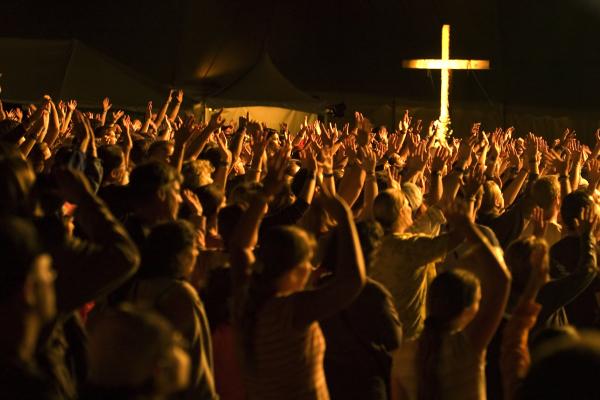Do Muslims and Christians worship the same God? It’s an age-old question that re-captivated evangelical Christians earlier this year with the high-profile contention and eventual parting of ways between evangelical Wheaton College in Wheaton, Ill., and Larycia Hawkins, professor of political science and the school’s first tenured female African-American faculty member.
But while the question of whether the god of Muslims is the god of Christians is interesting, says filmmaker and Wheaton grad (‘92) Linda Midgett, lost in the scuffle was a much more pressing and potentially divisive question: Do evangelicals worship the same God as other evangelicals?
“The more that I’ve been studying people’s responses to this situation, it’s almost like we have two gospels, with good people on both sides,” Midgett told Sojourners. “ … How do you have people who are very sincere in their faith and read the same Scripture who just are becoming so polarized that they can’t even talk to one another?”
Your answer to the question “Do evangelicals worship the same god?” probably depends what ilk of evangelical you are, a point Midgett raises in her coming documentary, Same God. The film, currently running a crowdfunding campaign on Indiegogo, will use the Wheaton controversy to poke at a strain of Christianity whose communally-held orthodoxy is increasingly showing cracks.
For Midgett, herself a lifelong evangelical, this project is personal.
“You’ve always had more conservative evangelicals and more progressive ones,” she said. “But I don’t remember it ever being as hostile as it is now. There’s a real lack of charity.”
Indeed, in the same months as the Hawkins debate at Wheaton, controversy erupted around evangelical student ministry InterVarsity’s annual conference from the left and the right, when featured speaker Michelle Higgins praised Black Lives Matter as “a movement on mission in the truth of God” even while InterVarsity publicly distanced itself from anti-police rhetoric.
“I’ve had lots of conversations with people who have emphatically said, ‘This is not about race, this is about theology,’” Midgett said. “Something I’m exploring is whether it’s possible to have a discussion that’s just about theology. Because that’s what evangelicals tend to fall back on. That’s one of reasons the Hawkins story is such a great case study. There are people who really see the racial dynamics at play, and people who genuinely don’t see it. [Same God] is an opportunity to say, ‘How can that be?’”
This question has been nagging at Midgett since at least 2011, when evangelical pastor-theologian John Piper famously tweeted “Farewell Rob Bell” to the evangelical pastor-author over Bell’s controversial book about heaven and hell, Love Wins. Midgett remembers this as the moment that Bell was “more or less kicked out of evangelicalism.”
“And I see that with Dr. Hawkins,” Midgett said. “[People saying,] ‘Her theology is wrong, so it’s OK that she lost her tenured position, it’s OK that she lost her livelihood over that.’
“[So] if it’s really just about theology, people feel free to say, ‘If you have bad theology then whatever happens to you is really your problem, and I don’t have to have any compassion for you.’”
To be sure, there are clear differences, some contentious, between left and right strains of evangelicalism. But to ask whether evangelicals even worship the same god drives the question much higher. Midgett, careful to note that she’s not a theologian, says she aims primarily to ask questions and collect stories. But she hazards a sketch of at least two prevailing and conflicting personalities of the god(s) evangelicals worship: namely, a god of dominance and a god of service.
“One of the things I really see happening is as Christians in America, evangelicals are losing their cultural dominance, and I see a lot of fear associated with that. I see a lot of anger. I guess that’s almost like a god of dominance,” Midgett said. “And that’s in contrast to the god of suffering, the god who comes as a servant to die for us. Those two things are really two completely different paradigms.”
Midgett points to current global events — like the recent case of political leaders, who are also avowed evangelicals, calling for the American government to turn away Syrian refugees — as a testing ground for these two understandings of God.
The clock is running down on Midgett’s Indiegogo campaign, but she says the film will be made either way. For her, documentary film is a vital medium for her ultimate goal: reconciliation and understanding.
“Specifically with the Hawkins case, it would benefit all sides to hear the individuals involved talk about what happened — to actually look at their faces, listen to their tone of voice, look at their body language,” Midgett said. “That’s information that’s very helpful. It breaks down stereotypes, and that goes both ways.”
Can Wheaton, and evangelicals broadly, really reconcile? Midgett is cautiously optimistic.
To simply say “‘It’s done, we’ve moved on,’ leaves you with a cynical feeling,” she said. But “when you engage with narrative in a longer way, there’s hope.”
Got something to say about what you're reading? We value your feedback!

